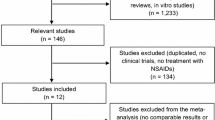Abstract
Background
Non-steroidal anti-inflammatory drugs (NSAIDs) are one of the most commonly used medications in the elderly. They have been widely studied as possible preventive agents against cognitive decline because of the properties of anti-inflammatories, which sustain cerebral blood flow and mitigate the neurotoxicity of microglial cells. However, the results remain controversial.
Objective
Our objective was to assess the effects of NSAID use on the risk of cognitive decline. We reviewed and quantitatively synthesized the evidence from prospective cohort studies via a meta-analysis.
Methods
We identified pertinent studies by searching the PubMed, EMBASE, and China National Knowledge Infrastructure databases through to December 2015 and by reviewing the reference lists of retrieved articles. We used fixed- or random-effects models to pool relative risks (RRs) with 95 % confidence intervals (CIs) and performed sensitivity analyses to evaluate the robustness of the results. Small-study effect was evaluated using Egger’s test and funnel plots.
Results
Of the 2171 articles identified through searching the databases, ten articles including 11 prospective cohort studies were eligible. Overall, NSAID use was associated with a 13 % decreased risk of cognitive decline (pooled RR 0.87; 95 % CI 0.81–0.94). In subgroup analysis, the pooled RRs were 0.89 (95 % CI 0.81–0.98) for follow-up time ≥5 years, 0.85 (95 % CI 0.75–0.96) for follow-up time <5 years, and 0.85 (95 % CI 0.78–0.93) for studies conducted in North America, respectively. Sensitivity analyses found results to be robust. No evidence of significant small-study effect was identified.
Conclusions
This meta-analysis of prospective cohort studies indicates that NSAID use may be associated with a decreased risk of cognitive decline. Larger, high-quality randomized controlled trials are needed to verify the effects of NSAID use on the risk of cognitive decline.




Similar content being viewed by others
References
Akiyama H, Barger S, Barnum S, et al. Inflammation and Alzheimer’s disease. Neurobiol Aging. 2000;21:383–421.
Patrono C, Roth GJ. Aspirin in ischemic cerebrovascular disease. How strong is the case for a different dosing regimen? Stroke. 1996;27:756–60.
Rozzini R, Ferrucci L, Losonczy K, Havlik RJ, Guralnik JM. Protective effect of chronic NSAID use on cognitive decline in older persons. J Am Geriatr Soc. 1996;44:1025–9.
Sturmer T, Glynn RJ, Field TS, Taylor JO, Hennekens CH. Aspirin use and cognitive function in the elderly. Am J Epidemiol. 1996;143:683–91.
Hanlon JT, Schmader KE, Landerman LR, Horner RD, Fillenbaum GG, Pieper CF, Wall WE, Koronkowski MJ, Cohen HJ. Relation of prescription nonsteroidal antiinflammatory drug use to cognitive function among community-dwelling elderly. Ann Epidemiol. 1997;7:87–94.
Peacock JM, Folsom AR, Knopman DS, Mosley TH, Goff DC, Szklo M, Investig ARCS. Association of nonsteroidal anti-inflammatory drugs and aspirin with cognitive performance in middle-aged adults. Neuroepidemiology. 1999;18:134–43.
Jonker C, Comijs HC, Smit JH. Does aspirin or other NSAIDs reduce the risk of cognitive decline in elderly persons? Results from a population-based study. Neurobiol Aging. 2003;24:583–8.
Kang JH, Grodstein F. Regular use of nonsteroidal anti-inflammatory drugs and cognitive function in aging women. Neurology. 2003;60:1591–7.
Cote S, Carmichael PH, Verreault R, Lindsay J, Lefebvre J, Laurin D. Nonsteroidal anti-inflammatory drug use and the risk of cognitive impairment and Alzheimer’s disease. Alzheimers Dement. 2012;8:219–26.
Wichmann MA, Cruickshanks KJ, Carlsson CM, Chappell R, Fischer ME, Klein BE, Klein R, Schubert CR. NSAID use and incident cognitive impairment in a population-based cohort. Alzheimer Dis Assoc Disord. 2016;30(2):105–12. doi:10.1097/WAD.0000000000000098
Fourrier A, Letenneur L, Begaud B, Dartigues JF. Nonsteroidal antiinflammatory drug use and cognitive function in the elderly: inconclusive results from a population-based cohort study. J Clin Epidemiol. 1996;49:1201.
Ancelin ML, Carriere I, Helmer C, Rouaud O, Pasquier F, Berr C, Chaudieu I, Ritchie K. Steroid and nonsteroidal anti-inflammatory drugs, cognitive decline, and dementia. Neurobiol Aging. 2012;33:2082–90.
Moher D, Liberati A, Tetzlaff J, Altman DG. Preferred reporting items for systematic reviews and meta-analyses: the PRISMA statement. Int J Surg. 2010;8:336–41.
Stang A. Critical evaluation of the Newcastle–Ottawa scale for the assessment of the quality of nonrandomized studies in meta-analyses. Eur J Epidemiol. 2010;25:603–5.
Higgins JPT, Thompson SG. Quantifying heterogeneity in a meta-analysis. Stat Med. 2002;21:1539–58.
Higgins JP, Thompson SG, Deeks JJ, Altman DG. Measuring inconsistency in meta-analyses. BMJ. 2003;327:557–60.
Egger M, Davey Smith G, Schneider M, Minder C. Bias in meta-analysis detected by a simple, graphical test. BMJ. 1997;315:629–34.
Zandi PP, Breitner JC. Do NSAIDs prevent Alzheimer’s disease? And, if so, why? The epidemiological evidence. Neurobiol Aging. 2001;22:811–7.
Klegeris A, McGeer PL. Non-steroidal anti-inflammatory drugs (NSAIDs) and other anti-inflammatory agents in the treatment of neurodegenerative disease. Curr Alzheimer Res. 2005;2:355–65.
Weggen S, Eriksen JL, Das P, et al. A subset of NSAIDs lower amyloidogenic Abeta42 independently of cyclooxygenase activity. Nature. 2001;414:212–6.
Author information
Authors and Affiliations
Corresponding author
Ethics declarations
Source of funding
This work was supported by the National Natural Science Foundation of China (No. 31371024).
Conflict of interest
WeiJing Wang, YanPing Sun, and DongFeng Zhang declare that they have no conflicts of interest relevant to the content of this article.
Electronic supplementary material
Below is the link to the electronic supplementary material.
Rights and permissions
About this article
Cite this article
Wang, W., Sun, Y. & Zhang, D. Association Between Non-Steroidal Anti-Inflammatory Drug Use and Cognitive Decline: A Systematic Review and Meta-Analysis of Prospective Cohort Studies. Drugs Aging 33, 501–509 (2016). https://doi.org/10.1007/s40266-016-0379-9
Published:
Issue Date:
DOI: https://doi.org/10.1007/s40266-016-0379-9




